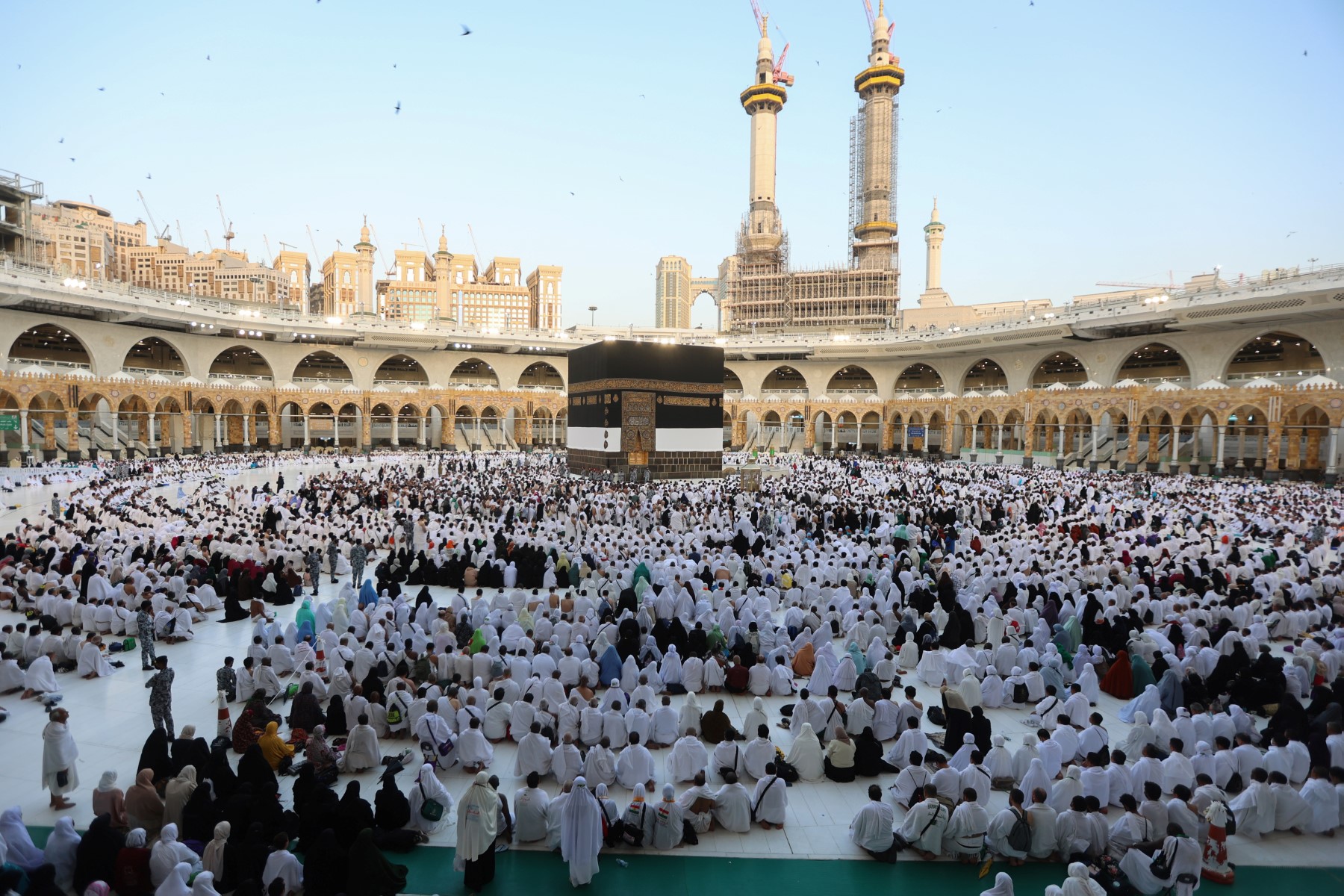Hajj 2023: Of sacrifice and exemplary leadership (II)
Yes. Hajj 2023, like the ones before, was that of stories of sacrifice and exemplary leadership. It was that of stories of people who became ‘stories’. Indeed, to participate in any hajj exercise is to become a griot, a storyteller; and for some, quite ironically, it is to become a ‘story’ to be told. Yes. […]

FILE PHOTO: Muslim pilgrims gather around the Kaaba, Islam’s holiest shrine, as they perform Eid Al-Adha morning prayers in Mecca, on June 28, 2023. (Photo by Abdulghani BASHEER / AFP)
Yes. Hajj 2023, like the ones before, was that of stories of sacrifice and exemplary leadership. It was that of stories of people who became ‘stories’. Indeed, to participate in any hajj exercise is to become a griot, a storyteller; and for some, quite ironically, it is to become a ‘story’ to be told. Yes. Or how else might we refer to her destiny other than that of the story to be told- the pilgrim from Lagos who went through the rigour and the trials of joining that batch only for her to answer the divine call as soon as she set her foot on to Jeddah?
How might we describe her circumstance except that of the story destined by her Creator to be told of that pilgrim who entered the restroom in her hotel in Makkah only to be brought out dead after a short while thereafter?
How else might we tell the story but in ‘stories’ of the bearer of the womb who departed Arafah after sunset of the 9th of Dhul Hijjah and headed towards Muzdalifah in order to hearken to the instructions of the Prophet of Allah (upon him be peace) only to arrive into the waiting hands of the liquidator of all earthly pain and pleasure?
And how else might you relate the story of the elderly pilgrim who fell into a ditch in the same Muzdalifah, hit his head against a stone, had blood gushing out of his head like a fountain only for him to rise, as if from the throes of death, in order for him to complete the rites of hajj? Hajj 2023 tells the story of life and living, of hope in the midst of hopelessness and of certainty when doubts lurked in the horizon.
- Ondo communities protest, disrupt public hearing on creation of LCDAs
- Journalists trained on climate change reporting
Hajj 2023 also ‘told’ the stories of some chairmen and leaders of pilgrims who were completely selfless and committed in their pursuit of the welfare of the visitors to the house of the Owner of the heavens and earth. Yes. His story was told to me of one of my former followers in the highest leadership echelon the Muslim Students’ Society of Nigeria (MSSN) whom Allah has made the chairman of his state’s pilgrims’ welfare board in the northwest of this country.
His story was told to me of how he fought the principalities of greed and rapacious avarice in defence of pilgrims who were entrusted to his care. These were chairmen of state pilgrim welfare boards who constantly reminded themselves that they shall be called to account by their Creator on their conduct of hajj exercise.
Yet. Other stories abound: of chairmen who left their pilgrims behind while they jumped onto the plane heading for Saudi Arabia. Other stories abound: of chairmen of state pilgrims welfare boards who turned the hajj exercise to a business venture and consequently deprived their pilgrims of the minimum comforts that the latter had paid for and deserved: “Do these people forget that they shall be resurrected?”, the Almighty rhetorically asks (Quran 83: 4). Have they forgotten that they shall be resurrected on that great day when neither money nor status shall be of help or use?
Yet more stories that can only be told in stories – the story of our trip from the Jamarrat to the Haram in Makkah on the 12th day of Dhul Hijjah. In the company of two other younger brothers, we decided to challenge our resilience. We wanted to know how much youthfulness remained in our bones and blood.
From the Jamarrat we started trekking to Makkah. It turned out to be an adventure; an experience in the pursuit of the celestial. It turned out to be an endurance trek from the known towards the known.
The trip, which lasted close to two hours, reminded me of how challenging the trip of Prophet Muhammad and Abubakr was between Makkah and Madinah. Unlike the latter, our pathways were largely under prefabricated encampments; unlike the Prophet’s trip on the unknowable landscape of the Sahara, we encountered Saudi hajj officials who constantly provided us with heat-cooling sprays and cold water.
On our way, we encountered female pilgrims who had become males by the strength of their stride, by their determination to arrive at the Haram before Jumaat service and by the same fervent passion to partake of the spiritual boon that the Ayyam tahsriq afforded all without prejudice to race or gender.
But one other story of sacrifice remains etched in my memory till today. It is the story of a couple whom we met on our way that day. Aged between 65 and 70, they had luggage in between their hands. We knew that they were also coming from Mina, from Jamarrat. We knew that they were heading to the Haram in Makkah. We also knew that their legs were “giving up” on the journey. Driven by our passion for sacrifice in His cause, we then stopped to offer some help; we wanted to help them carry the luggage at least up to the Haram. But lo and behold! The old man said “no”, and emphatically too: “Who shall help us carry our burden on the day of judgement?”
